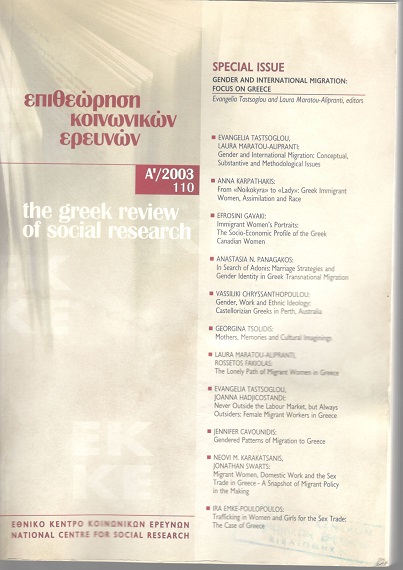In search of Adonis: marriage strategies and gender identity in Greek transnational migration
Abstract
Transnational migration, or the circular pattern of mobility between two or more nation-states, has been a relatively new phenomenon studied by social scientists. Focusing mainly on household economics and social networking, scholars are only now accounting for the effects of transnational migration on gender identity or marriage. Using the case of the Greek diaspora, this paper explores how transnational migration itself is used as a marriage strategy among young Greek Canadian women who travel to Greece in search of new lifestyles and potential marriage partners. I argue that the imagining of Greece as the ancestral homeland is realized through satellite television, travel, Internet and other forms of rapidly changing communications by creating a sense of belonging that transcends spatial and temporal distances. The search for an idyllic lifestyle and spouse has implications for how gender identity is performed and constrained by social conventions as individuals move between two different nation-states and two different gender systems. I address what «marriage strategies» constitute in the context of a globally mobile Greek population, and how women, traditionally viewed as a commodity in marriage exchange, utilize education and economic success to become decision makers in their marital choices.
Article Details
- How to Cite
-
Panagakos, A. (2003). In search of Adonis: marriage strategies and gender identity in Greek transnational migration. The Greek Review of Social Research, 110, 77–106. https://doi.org/10.12681/grsr.9167
- Section
- Articles

This work is licensed under a Creative Commons Attribution-NonCommercial 4.0 International License.
Authors who publish with this journal agree to the following terms:
- Authors retain copyright and grant the journal right of first publication with the work simultaneously licensed under a Creative Commons Attribution Non-Commercial License that allows others to share the work with an acknowledgement of the work's authorship and initial publication in this journal.
- Authors are able to enter into separate, additional contractual arrangements for the non-exclusive distribution of the journal's published version of the work (e.g. post it to an institutional repository or publish it in a book), with an acknowledgement of its initial publication in this journal.
- Authors are permitted and encouraged to post their work online (preferably in institutional repositories or on their website) prior to and during the submission process, as it can lead to productive exchanges, as well as earlier and greater citation of published work (See The Effect of Open Access).



